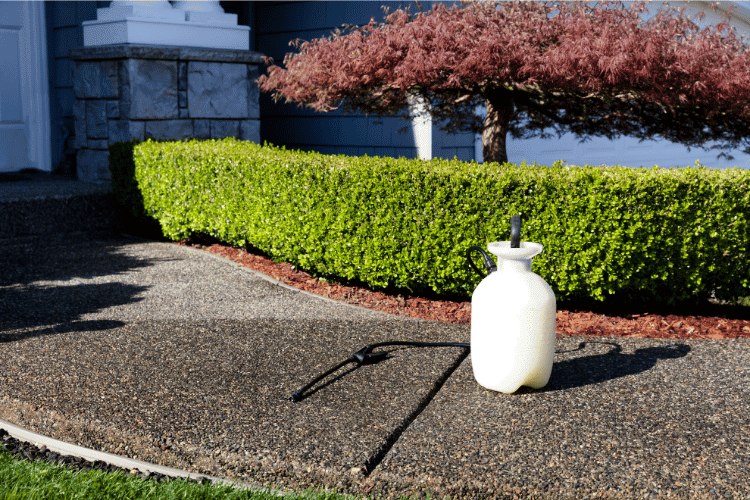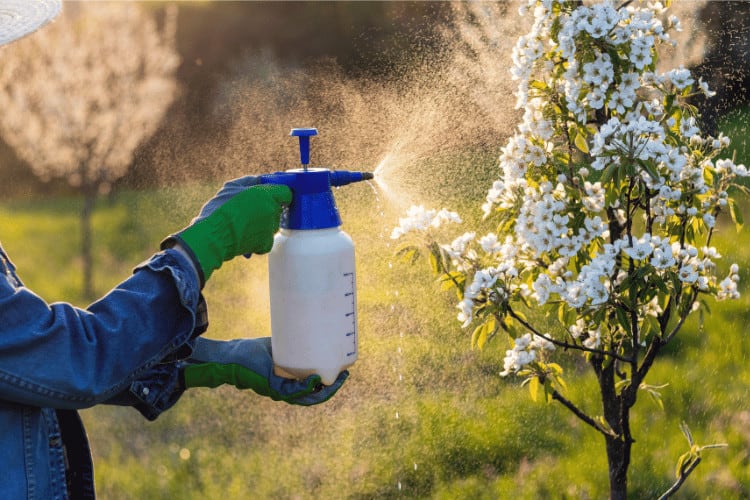Is Liquid Fence Safe for Bees?
Picture this: a haven of blooming flowers, a sight to behold for any nature lover.
Yet, lurking in the shadows are deer, infamous nibblers of all things floral. Enter Liquid Fence, a potential savior for your flower garden. It’s like a superhero, swooping in to fend off any garden pest.
But, hold up! What about our buzzing buddies, the bees? These tiny miracle workers love flowers too, so any repellent sprayed on flowers will end up in their mouths.
So, is Liquid Fence safe for bees? I’ll tell you everything you need to know here!
An Overview of Liquid Fence Deer Repellent

Ever wondered how Liquid Fence manages to cast a spell on those pesky deer and rabbits, turning your garden into a no-munch zone?
Well, let me spill the beans. I’ve had my share of battles with garden invaders, and I’ve seen the effects of Liquid Fence firsthand.
The active ingredient behind Liquid Fence is rotten eggs and garlic—the dynamic duo, forming the core of Liquid Fence’s secret weapon, targeting the sense of smell.
These guys don’t just make an ordinary stink; they create an aroma that animals like deer and rabbits just can’t stomach. Neither can I, but that’s not the point.
Take a look at the ingredients label, and you’ll find 24.65% of putrescent egg solids and 2.96% garlic, leading the charge against the munchers.
But that’s not all—there’s also a dash of sodium lauryl sulfate (0.61%), a familiar face in beauty products for its thickening prowess. And let’s not forget the natural preservative, potassium sorbate (0.49%), keeping things fresh and lively.
Is Liquid Fence Safe for Bees?
As a beekeeper, I know how important it is to ensure the safety of your bees from anything you decide to spray around. The concerns about Liquid Fence are legit.
However, Liquid Fence Deer & Rabbit repellent doesn’t carry a vendetta against bees, butterflies, or birds.
See, repellents like Liquid Fence aren’t expert marksmen; they cast a wide net. While they’re intended for specific animals, like those deer seeking their next meal, the truth is, other creatures could be caught in their path due to their strong odor or off-putting taste.
It’s a bit like hosting a garden feast and hoping only the right guests show up.
But here’s the buzz: most users seem to vouch for Liquid Fence being a garden safe product. Many seasoned gardeners have sung praises about using Liquid Fence over the long haul, with honeybees merrily buzzing about, seemingly unaffected.
Safety Precautions for Bees When Using Liquid Fence

When it comes to applying Liquid Fence Deer & Rabbit repellent, a little precision can go a long way in ensuring your buzzing buddies stay safe.
While Liquid Fence seeks to deter hungry deer and rabbits, it’s wise to avoid a direct treatment of flowering plants and their delicate petals. These blossoms are direct targets for pollinators like bees and butterflies.
Instead of spraying the entire plant, target your attention toward the foliage or lower reaches of plants that are more vulnerable to damage.
Safety’s the name of the game, and while Liquid Fence is generally considered a friend to our gardens, a little extra caution never hurt anyone.
Consider timing your application during those moments when beneficial insects are catching a break from their busy schedules—early mornings or late evenings. This way, the chances of them waltzing into the treated areas are minimal.
Additionally, while you’re busy safeguarding your ornamental plants and flower beds, remember to extend a friendly nod to the busy bees and fluttering butterflies by steering clear of their favored hangouts.
Is Liquid Fence Deer Repellent Effective?
Liquid Fence produces a strong odor that triggers deers’ natural aversion to some smells. Its success, however, comes with a caveat—deer are no amateurs. Over time, they’ve been known to acclimate to the repellent’s bad smell, turning their once wary noses into an afterthought.
It’s like they’ve figured out the scent’s secret, leaving you with nibbled flowerbeds despite your efforts.
The pros are clear: Liquid Fence can deter deer and let your plants flourish in peace. But the cons loom, such as the residual smell that might not sit well with human noses. There’s also the fact that heavy rain masks the smell, rendering the repellent useless.
Plus, there’s the question of water contamination due to runoff, an unintended consequence of using any repellent. In some cases, spraying repellents ends up contaminating surface water. Though Liquid Fence doesn’t contain any active ingredient that may cause that, it’s better to be safe than sorry.
So, what’s the game plan against these nibbling foes? Let’s explore alternative solutions that might stand strong against deer populations, where Liquid Fence occasionally falters.
Liquid Fence Alternatives: Natural Deer Repellents
From the classic physical barriers, like shorter fences designed for deer deterrence, to modern innovations that tap into deer behavior patterns, there’s a world of strategies to consider.

I’ve compiled a list of the easier alternatives to use:
- Essential Oil Elixirs: A mix of essential oils like garlic, peppermint, and clove can create a fragrant barrier that deters deer through their aversion to strong scents. Make sure to use different scents constantly to keep the deer away.
- Egg-Based Solutions: Just like Liquid Fence, a concoction of eggs and water can produce an odor that deer find off-putting. A blast of water mixed with eggs adds an element of surprise.
- Herbal Havens: Planting deer-resistant herbs like rosemary, sage, and thyme not only adds a touch of green charm but also emits scents that deer would rather avoid.
- Scare Tactics: Motion-activated devices that emit sudden noises or bursts of water can startle deer away from your garden.
Conclusion
I know what trying a new product feels like: the fear of hurting your co-existing friends and the constant doubts about its efficiency. When it comes to Liquid Fence, I’ve already established it’s effective, albeit for a short time because deer will eventually get used to the smell.
But, is Liquid Fence safe for bees? It appears so. There’s nothing alarming in the deer repellent’s formula, and bees seemingly don’t react to it.
